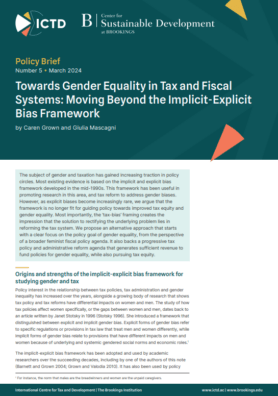Policy Brief 5
The subject of gender and taxation has gained increasing traction in policy circles. Most existing evidence is based on the implicit and explicit bias framework developed in the mid-1990s. This framework has been useful in promoting research in this area, and tax reform to address gender biases. However, as explicit biases become increasingly rare, we argue that the framework is no longer fit for guiding policy towards improved tax equity and gender equality. Most importantly, the ‘tax-bias’ framing creates the impression that the solution to rectifying the underlying problem lies in reforming the tax system. We propose an alternative approach that starts with a clear focus on the policy goal of gender equality, from the perspective of a broader feminist fiscal policy agenda. It also backs a progressive tax policy and administrative reform agenda that generates sufficient revenue to fund policies for gender equality, while also pursuing tax equity.

